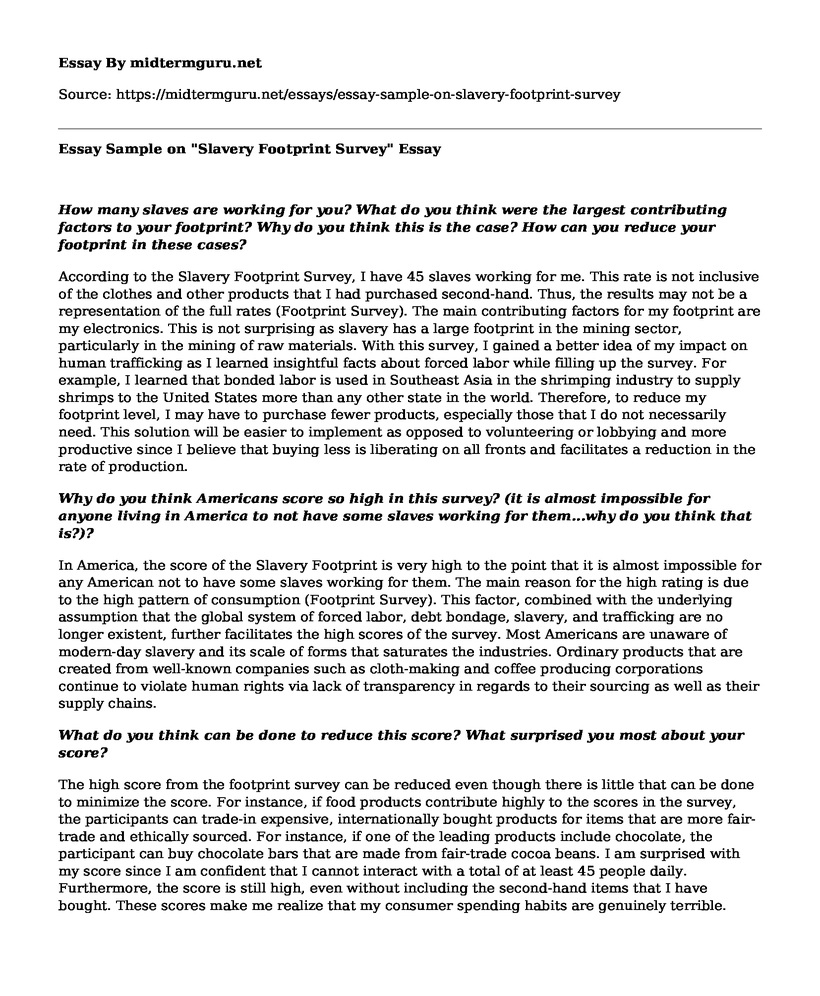How many slaves are working for you? What do you think were the largest contributing factors to your footprint? Why do you think this is the case? How can you reduce your footprint in these cases?
According to the Slavery Footprint Survey, I have 45 slaves working for me. This rate is not inclusive of the clothes and other products that I had purchased second-hand. Thus, the results may not be a representation of the full rates (Footprint Survey). The main contributing factors for my footprint are my electronics. This is not surprising as slavery has a large footprint in the mining sector, particularly in the mining of raw materials. With this survey, I gained a better idea of my impact on human trafficking as I learned insightful facts about forced labor while filling up the survey. For example, I learned that bonded labor is used in Southeast Asia in the shrimping industry to supply shrimps to the United States more than any other state in the world. Therefore, to reduce my footprint level, I may have to purchase fewer products, especially those that I do not necessarily need. This solution will be easier to implement as opposed to volunteering or lobbying and more productive since I believe that buying less is liberating on all fronts and facilitates a reduction in the rate of production.
Why do you think Americans score so high in this survey? (it is almost impossible for anyone living in America to not have some slaves working for them...why do you think that is?)?
In America, the score of the Slavery Footprint is very high to the point that it is almost impossible for any American not to have some slaves working for them. The main reason for the high rating is due to the high pattern of consumption (Footprint Survey). This factor, combined with the underlying assumption that the global system of forced labor, debt bondage, slavery, and trafficking are no longer existent, further facilitates the high scores of the survey. Most Americans are unaware of modern-day slavery and its scale of forms that saturates the industries. Ordinary products that are created from well-known companies such as cloth-making and coffee producing corporations continue to violate human rights via lack of transparency in regards to their sourcing as well as their supply chains.
What do you think can be done to reduce this score? What surprised you most about your score?
The high score from the footprint survey can be reduced even though there is little that can be done to minimize the score. For instance, if food products contribute highly to the scores in the survey, the participants can trade-in expensive, internationally bought products for items that are more fair-trade and ethically sourced. For instance, if one of the leading products include chocolate, the participant can buy chocolate bars that are made from fair-trade cocoa beans. I am surprised with my score since I am confident that I cannot interact with a total of at least 45 people daily. Furthermore, the score is still high, even without including the second-hand items that I have bought. These scores make me realize that my consumer spending habits are genuinely terrible.
Do you think you have a moral responsibility to reduce your score? Why or why not? Please appeal to one of the moral theories we have discussed in the class (virtue, utilitarianism, deontology, land ethic, ecofeminism) in explaining your answer.
The Footprint scores are influential to the participants as they act as eye-openers to the consumption rate of Americans. Unintentionally, the survey will make you feel bad and at the same time, realize that you have a responsibility to reduce the score. However, the review is not accurate as it does not ask specific questions that will shed more light on the relationship between modern slavery and consumerism. The theory of deontology indicates that obligation, goodwill, and duty are of the highest importance. Therefore, as consumers, it is our responsibility to ensure that workers are not being oppressed in any form of the way through modern slavery and thus, I believe that I have a moral obligation to reduce my footprint score through purchasing fewer products.
Work Cited
Footprint Survey. "Slavery Footprint Survey." slaveryfootprint.org. Accessed 3 July 2019.
Cite this page
Essay Sample on "Slavery Footprint Survey". (2023, Jan 26). Retrieved from https://midtermguru.com/essays/essay-sample-on-slavery-footprint-survey
If you are the original author of this essay and no longer wish to have it published on the midtermguru.com website, please click below to request its removal:
- Government Intervention in Stabilizing the Market - Essay Sample
- Analysis of Americas Conversation on Race Political Cartoon - Essay Sample
- Paper Example on Using SMART Goals on Social Learning
- Buying Fur Clothes Leads to Climate Change - Argumentative Essay
- Professional Communication & Personal Effectiveness in Nursing - Essay Sample
- Hypertension: Myocardial Structural Changes and Cardiac Dysfunctions - Research Paper
- Defining Community: A Shared Understanding & More - Essay Sample







